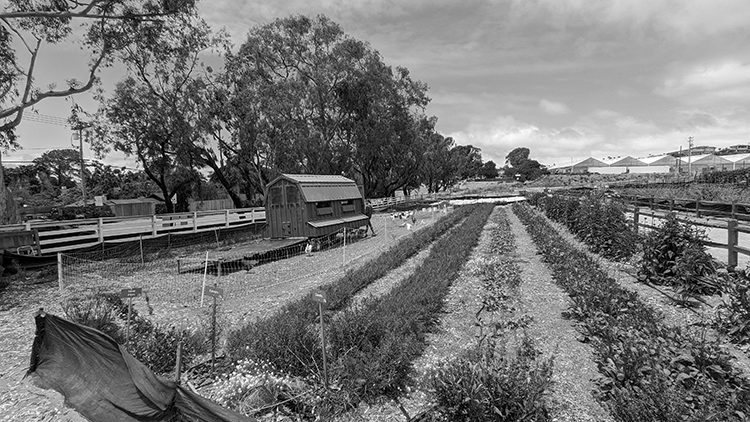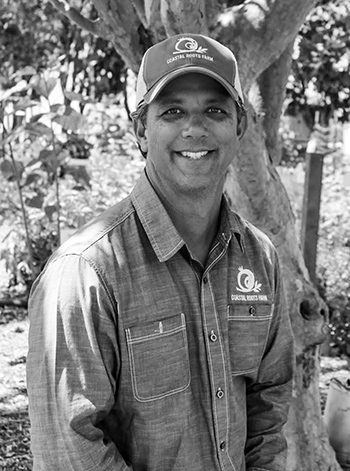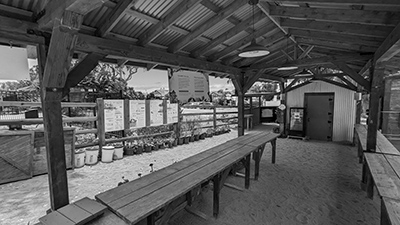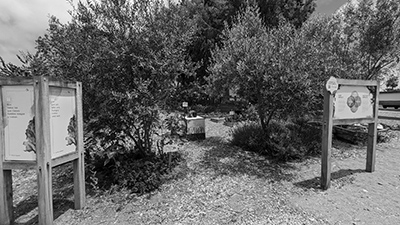 Editor’s Note: This is the 14th chapter in Volume 3 of Editor Emeritus Donald H. Harrison’s 2022 trilogy, “Schlepping and Schmoozing Along the Interstate 5.” All three books as well as others written by Harrison may be purchased from Amazon.com.
Editor’s Note: This is the 14th chapter in Volume 3 of Editor Emeritus Donald H. Harrison’s 2022 trilogy, “Schlepping and Schmoozing Along the Interstate 5.” All three books as well as others written by Harrison may be purchased from Amazon.com.
 Schlepping and Schmoozing Along the Interstate 5, Volume 3, Exit 41B (Encinitas Boulevard): Coastal Roots Farm
Schlepping and Schmoozing Along the Interstate 5, Volume 3, Exit 41B (Encinitas Boulevard): Coastal Roots Farm
From the northbound Interstate 5, take the Encinitas Boulevard exit, and turn right (east) and quickly make a left onto Saxony Road. The Leichtag Commons is on the right side of the street at 411 Saxony Road. Coastal Roots Farm is located on the Leichtag property.


ENCINITAS, California — When President and CEO Javier Guerrero was hired to head Coastal Roots Farm, self-described as a Jewish community farm, it was something of an anomaly.
Guerrero was neither a farmer nor Jewish. However, he had important experience that the Coastal Roots Farm board of directors and the Leichtag Foundation felt would be important as the Farm evolved from a Foundation-supported project that began in 2014 to an independent nonprofit operation starting in 2015.
His background was in cultural anthropology and in non-profit business development. Learning and seeking a deeper understanding and appreciation of other people’s cultures was one of his specialties. Moreover, he had spent eight years at Balboa Park’s Museum of Man (today the Museum of Us) rising to the position of Director of Operations and Deputy Director, and eight years as the Executive Director of the San Diego Children’s Discovery Museum in Escondido.
While being interviewed in 2018 by the Coastal Roots Farm board president for the position, Guerrero expressed concern that he might not be the right fit. In response, “I was told that I was very much the right candidate because of my organizational experience and Coastal Roots Farm was looking to grow its education and community programming. I had success growing the Children’s Discovery Museum from a rather small institution into a real formidable institution in terms of attendance, fundraising, marketing, capital campaigns, strategic planning, and access to hands-on education.”
He was assured that the Coastal Roots Farm already had in Adam McCurdy a very experienced farmer, with over 20 years of farming “so I didn’t need to have that expertise” but “what they didn’t have at the time was a dedicated education team and robust planning.”
After settling into the position, Guerrero grew the education team to five full-time educators, multiple part-time educators, and another dozen people to run a summer Farm Camp. From 2021 to 2022, “We went from 3,000 to over 6,000 children in school and youth groups coming through on visits,” he reported. Among students visiting the farm, which is located on 17 acres of the 67.5-acre Leichtag Commons in Encinitas, were all 1,500 fourth graders from the Escondido Union School District, as well as all fourth graders from the Carlsbad Union School District. Other elementary school districts were in discussions with the Farm, which with community support and contributions is able to subsidize program fees and transportation for districts in financial needs.
Just as Guerrero has learned a tremendous amount about farming, “I have also learned a tremendous amount about Judaism,” he told me during a May 2022 interview. “Our largest events of the year are the Sukkot Harvest Festival in the Fall and the Tu B’Shevat Food Forest Festival. To have the Farm as a place where people can experience and connect with land-based Judaism seems to be very powerful. A lot of people on their life’s journey, especially young people who don’t go to synagogue or temple, feel vary connected through the land to Judaism. So that is powerful.”
After four years heading Coastal Roots Farm, first as executive director, and later as the President and CEO of the independent, nonprofit farm, Guerrero can sling around a lot of Hebrew, some of which may be unfamiliar to non-Hebrew speaking American Jews.
The Farm observes the custom of peah, meaning leaving the corners of one’s field unharvested so they may be gleaned by strangers or the poor. The custom is best remembered in the biblical story of Ruth, who came to glean from the field of her future husband Boaz. Ruth was a direct ancestor of the biblical King David. A related concept is ma’asser, leaving at least one tenth of the agricultural yield for the poor. Educators teach the concepts of bal taschit (ethical consumption), kayamut (ecological sustainability), haganat ovidim (fair treatment of field workers), tsa’ar ba’alei chaim (kind, humane treatment of animals) and shmita (honoring the natural cycles of the earth). All of these can be considered part of the practice of tikkun olam (repair of the world.)
I asked Guerrero how he – born of a Catholic father from Mexico City and a Protestant mother from Buzzards Bay, Massachusetts – went about learning and assimilating Jewish practice.
“It is such a part of the day-to-day here,” he responded. “One of the beautiful things about being on this property is that there are so many programs that take place through the Hive (a co-working space for interrelated nonprofit organizations) and the Leichtag Foundation. I would say our staff is roughly half Jewish, half non-Jewish, and it is great for our staff to experience and learn and understand. There are always different scholars, seminars, workshops, and programs. In the first year that I was here, there was this amazing Jewish educator and rabbi, Chaya Gilboa, visiting from Jerusalem with her family. Now, she is the Executive Director of the Leichtag Foundation’s Philanthropic Initiatives in Jerusalem.”
Additionally, “There are always people coming here to visit; one was a gentleman who works for the Israeli government in the field of agriculture and Jewish law. The first educator we hired was Sharone Oren, who grew up in Israel and the United States and has a broad knowledge of education. At each staff meeting we will have a kavanah (intentional meditation) and some reflection. Before any of the holidays, we will talk about the holiday and make sure that everybody is understanding and feeling involved. You can imagine going through the cycle of the year – this now my fourth – that means four Shavuots, four Sukkots, four Tu B’Shvats and so forth.”
Coastal Roots Farm has articulated a four-part mission: 1) Regenerative Agriculture – they produce their own compost; rotate crops; rotate where chickens can forage; and plant over crops, among other practices.

2) Food justice and action – they sell fresh organic food at a stand at which people of limited income can pay what they can afford up to $30 and come twice a week. Also, they deliver food to Holocaust Survivors, low income military families, low-income seniors, tribal elders and families. They partner with the Iipay Nation of Santa Ysabel and the American Indian Health Center in downtown San Diego, local food pantries like Community Resource Center and Jewish Family Service, as well as with various community clinics like Vista Community Clinic.
3) Environmental STEM education – They provide hands-on classes in farming for school children and adult visitors, emphasizing science behind growing organic food, and the health and wellness benefits for our body. They share best practices such as planting cover crops to build healthy soil and sequester carbon dioxide, thereby helping the fight against climate warming.

4) Jewish life – In addition to celebrating the holidays and observing ancient Jewish agricultural practices, signs around the property quote relevant, inspirational passages from Jewish writings.
While the COVID-19 pandemic proved to be a most difficult time for many nonprofit organizations, Guerrero said, given the missions of Coastal Roots Farm, it was a time when “we hit our stride.” The need for inexpensive or free food increased as people lost their jobs. “That was when within two years we went from 40,000 pounds to 80,000 pounds of food grown per year which coincided with a time of great need,” Guerrero said.
At the same time, “We were able to provide on-line curricula and programs. We created drive-through Jewish life events for Sukkot, Shavuot, and Tu B’shvat. We were still able to bring kids outdoors. Some families needed childcare, so we pivoted and were able to step up an After-School on the Farm program to serve this critical need in the community.”
Guerrero, who is a devoted sailor in his spare time, suggested that the pandemic enabled Coastal Roots Farm to build up for the present time. “In sailing, when you hit the starting line, you don’t start like a runner from a static position,” he said. “You are positioning yourself to get maximum velocity to get the best wind coming across that starting line. I feel that is what we did coming out of the gate as things opened up more during COVID-19.”
During the pandemic, the staff built various physical structures and amenities around the Farm to aid both in food growing and educational missions. “We were building the ship as we were sailing,” he suggested. “We have amazing new program spaces, including an outdoor nature play experience focusing on early childhood development, indoor-outdoor Farm STEM Science Lab classroom, more infrastructure and growing spaces in the Food Forest, a welcome kiosk and other amenities all designed and built by our team.”
Each year, Coastal Roots Farm grows approximately 60 crops. “At any given time, we are growing about 30 crops, so we have a very wide diversity, Guerrero said. “We have all sorts of leafy greens from shards to different types of lettuce, mixed greens to broccoli to carrots to fennel to squash to tomatoes – whatever is in season really.” The Food Forest has a large amount of crops, a wide variety of fruit trees, fields for native pollinator plants, flocks of pasture-raised chickens, and large compost operation diverting over 900,000 pounds of waste annually from the landfill.
Emphasizing the importance of regenerative farming, Guerrero commented, “All good food comes from good soil. All our foods are extremely nutrient-rich because they are picked at peak ripeness. When someone comes to our farm stand, it can go from the ground, to being harvested, washed, placed in the farm stand, and consumed all within a few hours.”
“Every crop pulls a different nutrient from the soil, so in terms of intercropping and rotating our crops, we are very intentional about not planting the same crop in the same place,” he added.
He and his wife Priscila, a Brazilian engineer whom he met in San Diego while she was studying for a Master of Business Administration degree, have two children. At the time of our interview, Kai was 15 and Chiara was 13. Both children “have experienced first-hand the lessons and excitement of the Farm and a deep appreciation of the values surrounding land-based Judaism,” Guerrero said.
“We have developed a lot of personal friendships through the Farm and experienced many ‘firsts,’” Guerrero said. “We attended the first bar mitzvah, first bat mitzvah, first Havdalah, first Pesach, first Shabbat. Now it becomes seconds and thirds and each time one comes around I am excited to share something and invite my family!”
*
Donald H. Harrison is editor emeritus of San Diego Jewish World. He may be contacted via donald.harrison@sdjewishworld.com